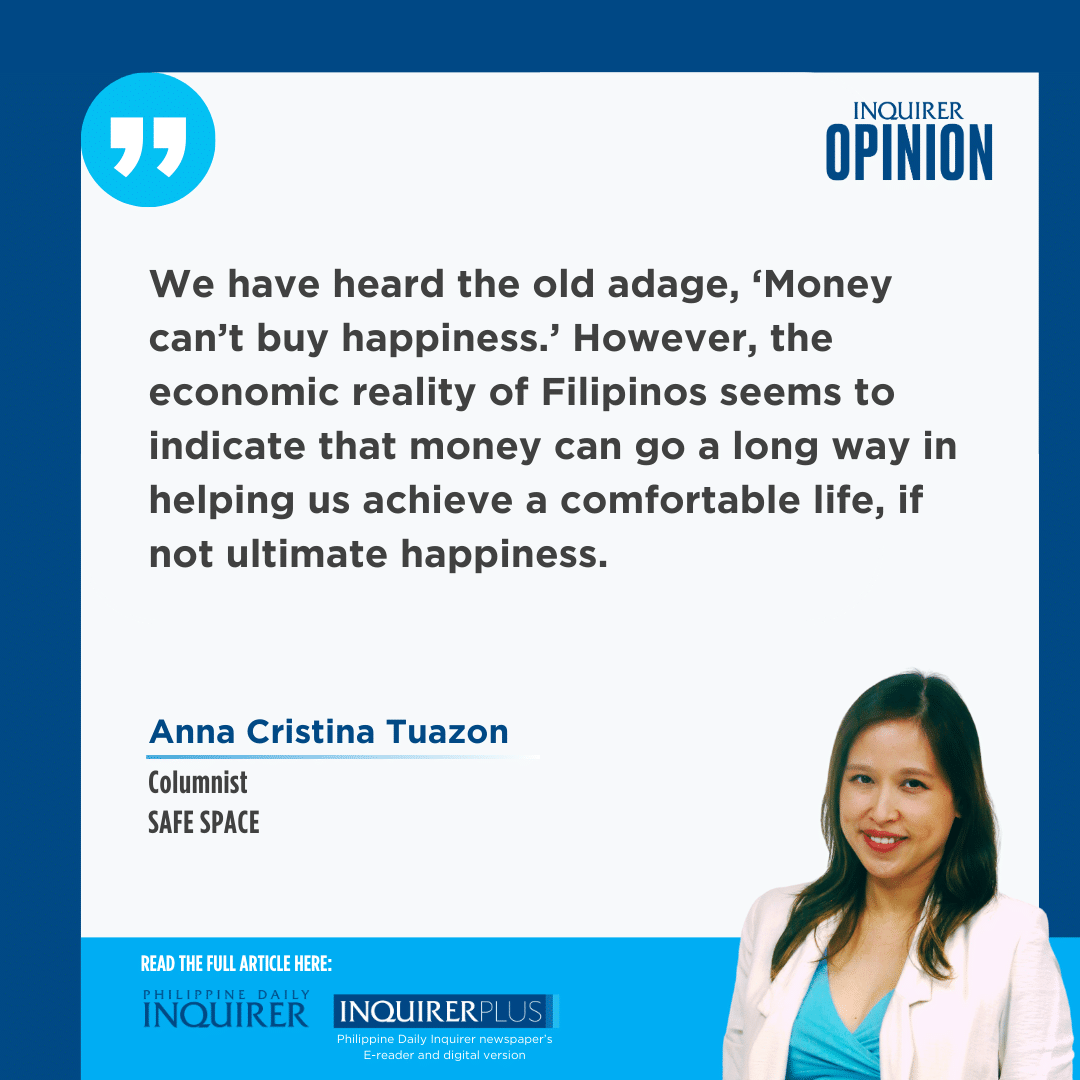Can money buy happiness?

At the What Works at Work Summit organized by the Philippine Daily Inquirer last Monday, I moderated a panel discussion entitled “Wellness and Well-being: Enhancing Mental Health, Pay, and Happiness in the Workplace.” I noted how they explicitly included pay, compensation, and benefits in the discussion. This speaks to a growing awareness that mental health isn’t siloed from financial aspects of work and life. Financial stress is a significant source of distress for many and are interrelated with job stress and marital or relationship stress. In other words, money issues can impact many areas of our lives, leading to unhappiness and poor mental health. Moreover, a recent study by Purdue University has claimed that Filipino families need P130,000 a month to be happy. This is a tall order, given that the Philippine Statistics Authority has estimated the average income of Filipino families at P29,436 a month (or P353,230 a year). Our average family income stands at roughly P15,000 more than the poverty threshold—the minimum income required for a family to meet the basic food and nonfood requirements—of P13,873. The average Filipino family may not be poor, but it doesn’t make them comfortable.
So, can money buy happiness? We have heard the old adage, “Money can’t buy happiness.” However, the economic reality of Filipinos seems to indicate that money can go a long way in helping us achieve a comfortable life, if not ultimate happiness. I was asked by a reporter recently whether people will still struggle with happiness even when they achieve the P130,000 per month as described by the Purdue study. The distribution of wealth in our country is so lopsided that I feel the reporter’s feared scenario may only apply to the very few. What is more pressing for the majority of Filipinos is how to secure financial stability so they can even begin to think about other ways of pursuing happiness.
Article continues after this advertisementMaslow’s hierarchy of needs describes how we prioritize more fundamental and basic needs over “higher” needs like knowledge and aesthetics. More importantly, he states that one cannot pursue higher needs until one’s more basic needs have been fulfilled. The hierarchy goes as follows: physiological needs (food, water, shelter), safety needs (safety, security), love and belonging (family, friends), esteem (respect, recognition, self-esteem), and growth needs (cognitive, aesthetic, self-actualization).
Based on this hierarchy, we can see how money can significantly address the first two basic needs. The monthly food threshold stands at around P64 per person, with the cost of basic food needs making up 70 percent of the poverty threshold. This does not even include housing, which is another basic need. With rising food and housing costs, our bar for happiness also increases as we need to focus on earning more before we can give space for our other needs.
Safety is another basic need. Financial security is essential to feeling safe in the modern world. It costs money to live in a safe neighborhood. We only need to look at disaster-prone areas and see how there is a glaring socioeconomic disparity in who faces the brunt of typhoons, floods, and fires. Rich people can afford to move to safer places; the poor do not have that luxury. The rich can also afford to put up walls, set up gates, hire guards, and keep people out. Ideally, our physical safety should be our government’s priority via police enforcement, but we also see how their protection is unevenly distributed.
Article continues after this advertisementThe next level of need is love and belonging. We can only attend fully to our relationships and connections once we feel safe. I remember when we asked netizens as to their reasons for not dating and a lot of them cited that dating is too expensive. They would rather focus their money on more basic needs rather than spend it on a relationship. Some even felt that they don’t deserve a relationship if they cannot yet afford one. Money—or the lack of it—can intrude even in our relationships. The younger generation have become increasingly practical about love and relationships, with not a few deciding early on not to have children due to not being able to afford caring for them. Even when encouraged to think of ways to date that do not cost money, most have the long-term in mind and do not see the point of starting a relationship if they cannot financially provide for a future family, thereby going back to more basic needs in the hierarchy.
It stands to reason that money helps to enhance our mental health too, which is related to both safety needs (as in psychological safety) and esteem needs (as in our sense of self-worth). The lack of economic stability that can fulfill our basic needs can lead us to not feel safe in our environment and make us hesitate to nurture connections that can be a source of support. Money is not the sole factor for happiness. But it does facilitate many of our needs that then will allow us to pursue happiness freely.
—————-
aatuazon@up.edu.ph
















